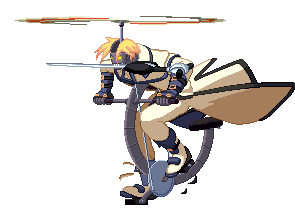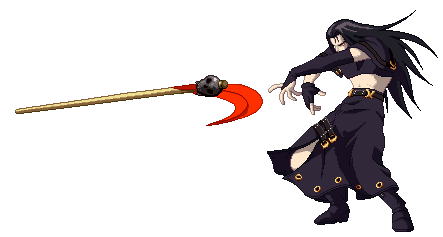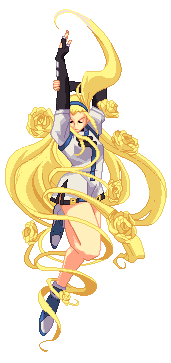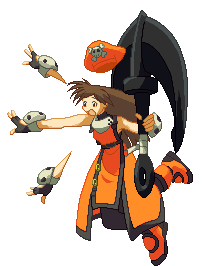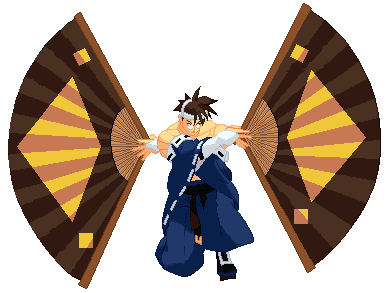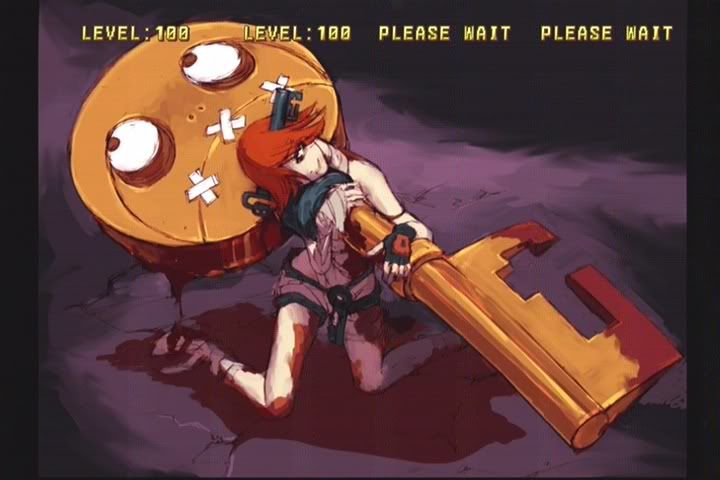Faust and Dizzy of ggxx. If you'd like to play a Japanese doctor with a huge scalpel who wears a bag over his head with one eye-hole, this is the game you've been waiting for. If that's not for you, try the half-angel, half-devil, half-naked girl who throws bubbles, homing arrows, and laser-beam-shooting chomping mouths.
There is a "design skeleton" shared by all the characters, with each character having his own unique "meat on the bones." Since the designer can count on all characters having so many ways to get out of trouble, he can then give each character an unusual amount of "unique unfairness."
Let's look at the "skeleton" of features common to all characters. I'll start with boring stuff and work my way up. I will spare you the exact definitions of these first items, but with only a few exceptions, all characters have access to this suite of movement abilities and basic attacks:
• Double Jump
• Ground and Air Dash
• Sweep Attack
• Overhead Attack that Launches
• Ground Throw and Air Throw
• Air Recovery (aka "tech recovery")
• A silly Instant Kill mode
"f+p" invulnerability. Every character has a move performed by holding forward on the joystick and pressing the punch button. For every character except Testament, this move grants some invulnerability to the upper body. This means that if an enemy jumps in at you, a f+p move is very good "anti-air." That is, it works well against attacks coming from above (unless the enemy expected it, and double jumped).
Super Meter. Lots of fighting games have a meter (other than your health meter) that gives you limited access to certain moves. In this game it's called the "tension meter" but we all know it's a "super meter." In ggxx, the meter charges up whenever you do anything offensive, such as attack, air dash forward, or even walk or run forward! All characters share the same mechanics for charging and expending super meter.
Green Blocking (aka "faultless defense"). While you are blocking, if you hold two buttons down, your character becomes surrounded by green rings. During this time, your super meter depletes, but you will take no "block damage" as you normally would from projectiles and other special attacks. Also, when you green block an attack, your defender will be pushed farther away than normal. This allows you to loosen up your opponent's traps pushing him too far away. You can also use green blocking while you are in the air to block attacks from an opponent on the ground (you can't block those types of attacks without green blocking).
Slayer (left), a vampire who is too ****ed good in like every version of this game, has his kick "green blocked" by Baiken (right), a cheap character who I hate playing against.
Slayer (left), a vampire who is too ****ed good in like every version of this game, has his kick "green blocked" by Baiken (right), a cheap character who I hate playing against.
Super Moves (aka "overdrive attacks"). Each character has a few big moves that require half of a full super meter to use. Very standard in fighting games.
Alpha Counter/Guard Reversal (aka "dead angle" attacks). All those confusing terms mean the same thing: while you are blocking an attack, you can perform this maneuver to cancel your blockstun (the time you are stuck blocking an attack) with an attack of your own, for the cost of half of a full super meter. This means that if you are being overwhelmed by attacks, you can block and use this maneuver to get the opponent off of you.
Roman Cancel (rc). Now we're getting to the wacky stuff. Almost every attack in the game can be "roman cancelled," which means cancelled instantly in a flash of red. This is performed by pressing three buttons during the course of almost any move, and it costs one half of a full super meter. There are numerous uses for this. You can do an "unsafe move" with very bad recovery, then roman cancel the move when the opponent tries to hit you back. You can do a combo, then roman cancel what would normally be the last hit, which usually allows you to continue the combo.
Zappa doesn't fight. Zappa's fans fight for him. These fans just happen to be the undead.
False Roman Cancel (frc). We are deep in the dangerous territory of poorly translated Japanese terms. Perhaps this is intended to be a "force" rather than a "false" cancel. "Roman" seems to be short for "romantic," by the way, which makes no sense either. Anyway, an frc is very similar to an rc. Each character has a few moves that have a small window of frames where an frc is possible. If you attempt to do a normal rc (press 3 buttons) during one of these special windows, you get a blue flash rather than red, and you spend only half as much super meter as a normal roman cancel costs. What's the point? Most frc's are associated with moves that allow you to keep up pressure in your attacks. You might throw a projectile, frc (so you have no recovery at all), dash in and do a few normal attacks, then do the projectile again and frc it, repeat. Without frc's, you have to do the normal red roman cancel which takes half your super meter. That means you'd have only two repetitions of a trap at most, rather than four frc's before your suepr meter runs out.
Once a clone, now a ball of crazy, Robo-Ky will always keep you entertained.
Testament, the trap man, dresses like a lady, talks and fights like a ****** who smokes.
Infinite Combo Safeguards
These next several features all contribute to preventing "infinite combos." An infinite combo is a situation where once the opponent lands the first hit of the combo (in the right situation), then he can continue the combo forever until he wins. The more complicated a fighting game is, the more likely it is to have unwanted infinite combos. The designers of ggxx put many systems in place to reduce the likelihood that such combos could exist.
Burst. This is the most blatant solution: a move that lets you break out of a combo. This taboo concept is very rare in fighting games, after the semi-fiasco of the "c-c-c-combo breaker!" in the game Killer Instinct. That game allowed the victim of a combo (who usually cannot do anything at all until the combo ends) to input a paper/rock/scissors guess that would allow him to escape the combo. This guess had no cost, so it was extremely common (too common) to break out of combos in that game.
In ggxx, there is an entirely separate meter (the burst meter) that keeps track of how often you are allowed to burst (about once per round). You always start the first round of a game with a full burst meter. Once you use the burst (it's the only move you are allowed to do while you are in hitstun, by the way), you can't use it again until your burst meter refills. The burst meter refills slowly over time, and it also increases the more you get hit. Getting hit by some moves (moves more likely to create infinite combos) fills your burst meter faster than others.
The burst is like a "get out of jail free card." It lets every character get out of trouble once, "for free." Of course, a clever opponent can expect the moment you will burst and simply voluntarily stop attacking right before your burst, then punish the recovery of your burst with an even bigger combo, so you have to be careful.
I should also note that there is an alternate use of the burst, a use often called a "gold burst" or "offensive burst." So far, I have only talked about activating the burst while you are in hitstun (the brief period of time where you are reeling back after getting hit by an attack during which you can perform no moves except a burst). But you are allowed to perform a burst almost any other time as well. You can burst at the first moment of the round if you want to. If you perform a burst when you are NOT in hitstun and the very beginning of the burst actually hits the opponent, then you instantly get a full super meter (aka "tension meter".) So what's the significance of that? If you are getting rushed down and overwhelmed by attacks, you should use the first type of burst to get out of trouble. But if you are the one doing the attacking, you don't need to get out of trouble. You want to cause even more trouble. So you can attack the enemy and use lots of rc's and frc's (those use up your super meter), then you can "gold burst" suddenly as they try to get you off them, and if that burst connects, you will have a newly full super meter to perform even more rc's, frc's and supers in your attack pattern.
Millia fights with her hair, and looks sexy while doing it.
May is a 13 year old who fights with an anchor and dolphins. Cutest fighting game charecter ever? Oh yes.
Yes, there are a lot of meters in this game. Right under your health meter is a little red meter called the guard meter. It starts at 50% full, and naturally tends to wander back to 50% over time. The more attacks you block, the higher that meter gets. The more attacks you get hit by, the lower that meter gets. The higher the meter is (the more attacks you recently blocked) the less you benefit from the game's normal system of damage scaling. Usually, when you get hit by a combo, each successive hit is "scaled" down in damage more and more. But when your guard meter is high, even an ordinary combo can do massive damage to you because you are not being protected by the usual damage scaling. This is meant to punish overly defensive players.
On the flipside, the lower your guard meter is (meaning you got hit by a lot of attacks in a short period of time), the more damage scaling you benefit from. A very, very long combo will eventually do only one pixel of damage per hit because of this feature. So even if an infinite combo did exist, it would take an incredibly large number of hits to actually kill you. Furthermore, you receive another even more important protection when your guard meter is low: reduced hitstun. Every time you get hit by a move, you are briefly stuck in a reeling animation where you can't do anything (except burst). This is the basic concept that allows combos to exist at all, since the opponent can often hit you again before your hitstun ends. But in ggxx, the more you get hit, the shorter your guard meter becomes, and the shorter your hitstun becomes. So if there exists a combo that is a "loop" of repeated moves, it may be possible to do 3 or 4 repetitions of the loop, but eventually the opponent's hitstun becomes so short that the combo simply stops working.
Progressive Gravity. Another safeguard against infinite combos. The longer your character is being juggled by a combo in the air, the greater the force of gravity on your character becomes. Many infinite combos in fighting games involve "juggling" a character in the air with attacks. Much like with actual juggling, it is a fight against gravity to keep it all going. While it might be possible to do 3 or 4 repetitions of a juggle loop, eventually the victim's body falls so fast to the ground that the juggle is no longer possible.
Potemkin no fast. Potemkin smash.
Anji plays by abusing invinsibility frames to pile through your opponents attacks. The best offense is always the best defense in his case.
Summary of Mechanics Shared by All Characters
Phew, some of you might have even made it through reading all that! Let's do a short recap, just the broad strokes of it all. If you want to attack, ggxx gives you super meter, and gives you several options to spend that meter to enhance your attack (rc's, frc's, and super moves). The guard meter system allows you to punish opponents who block too much. Those opponents are being somewhat punished by the game system in general anyway, since blocking doesn't build super meter but attacking does.
More important, I think, are the game systems that help you when you are BEING attacked. Every character has upper body invulnerability with their f+p move (except Testament). That alone is a great help in stopping attackers. If you want to spend super meter as a defender, you can green block or alpha counter. Green blocking will protect you from all damage while you block (except throws) and it will push that nasty attacker away from you. Alpha countering is another method to get the attacker off of you, and it can be performed while you are in blockstun.
That's a lot right there, but there's plenty more. If you actually get hit by an attacker, you have all sorts of things going for you. Your guard meter will eventually reduce the damage you take by the combo and shorten your hitstun allowing you to escape. Increased gravity will also eventually thwart their combo. You can nip it all in the bud, though, by simply bursting right at the very start of their combo, avoiding almost all damage. And don't forget that a great way to nullify attacks is simply not to be in the way of them. Every character can double jump, and every character but one can air dash.
source-
http://www.sirlin.net/articles/fail-safes-in-competitive-game-design-a-detailed-example.html




